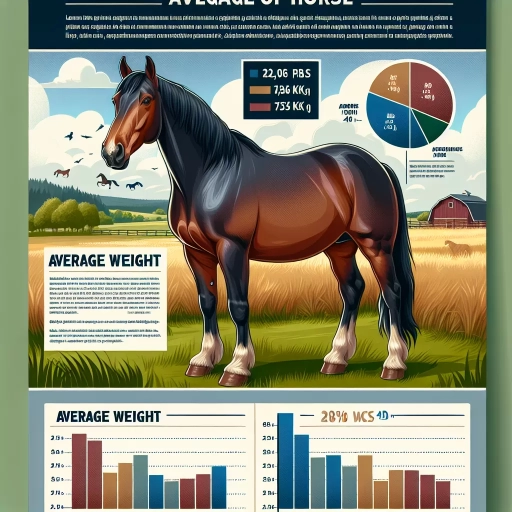How Much Does A Horse Weigh

Understanding the Weight of a Horse
The Factors Influencing a Horse's Weight
There are many factors that contribute to a horse's weight, and these variables can make it difficult to provide a universal answer to the question of how much a horse weighs. Age, breed, diet, and exercise regimen are all aspects that can greatly affect a horse's weight. It's essential to consider these factors when trying to determine a horse's weight, as they can drastically alter the outcome. For instance, a young, small-breed horse that is fed a low-calorie diet and exercises regularly will weigh considerably less than an adult, large-breed horse that has minimal exercise and a high-calorie diet.
Typical Weight Range for Different Breeds of Horse
While it's tough to provide a definitive answer to how much a horse weighs without considering the factors mentioned above, it is possible to give a typical weight range for different breeds of horses. For instance, Thoroughbreds, known for their speed and racing capabilities, typically weigh between 1,000 and 1,200 pounds. On the other hand, Draft horses, recognized for their strength and usually used for labor, can weigh anywhere from 1,600 to 2,400 pounds.
Importance of Proper Weight Management in Horses
Understanding how much a horse weighs and maintaining a healthy weight is critical for the horse's overall well-being and performance. Overweight horses can develop a variety of health issues, including laminitis, a painful condition affecting the horse's feet, and equine metabolic syndrome, a disease similar to human metabolic syndrome. On the other hand, underweight horses can suffer from malnutrition and decreased performance and could be susceptible to illness and disease due to a weakened immune system.
Methods for Estimating a Horse’s Weight
Using a Weight Tape
One common method used to estimate a horse's weight is by using a weight tape. This tape is specially designed to provide a weight approximated based on a horse's heart girth. Though this method may not give the most accurate result - as it doesn't account for factors such as muscle tone and fat distribution - it is still considered a feasible option, especially for horse owners who do not have access to large weighing scales.
Mathematical Formulas
For a more accurate estimation, there are also mathematical formulas that can be used to calculate a horse's weight. These equations take into consideration a horse's girth and body length, providing an estimate that accounts for the horse's build and size. Breed and type of horse can also factor into these calculations for more accurate estimates.
Digital Scales
The most accurate measurement of a horse's weight would be obtained using a large animal scale. This method, however, is not always feasible due to the scale’s high cost and the lack of availability in many areas. Despite this, it’s a method often used by research departments, veterinary hospitals, or large breeding or racing operations.
Impact of Weight on a Horse's Health and Performance
Health Impact
The weight of a horse directly correlates with its health. As suggested, both overweight and underweight horses can suffer from a series of health issues. Regularly monitoring the weight not only helps understand the feeding and exercise regimen required for the horse but can also act as a diagnostic tool. Sudden weight loss could indicate illness, while rapid weight gain could be an early sign of pregnancy or other conditions.
Performance Impact
Horses used in sports or work-related tasks can see a direct impact of their weight on their performance. An overweight horse may struggle with stamina and speed, while an underweight horse may lack strength and endurance. Regular monitoring and management of weight is key for equine athletes or working horses.
Longevity Impact
Maintaining a healthy weight isn't just critical for a horse's immediate performance but can also affect their long-term health and longevity. Overweight horses can suffer from joint issues due to the excess weight they carry, which can shorten their lifespan. Similarly, underweight horses may have weakened immune systems, making them more susceptible to disease and illness.